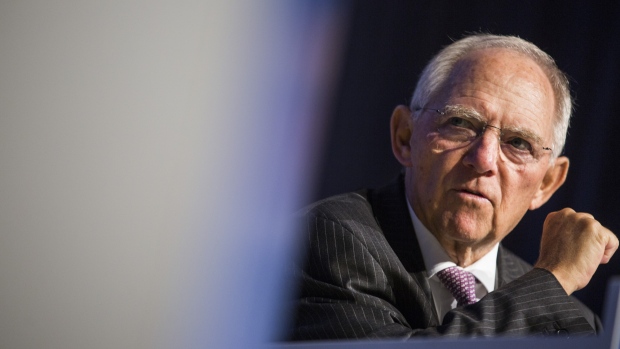Dec 6, 2018
Merkel's Party Gathers to Deliver a Verdict on Her 13-Year Rule
, Bloomberg News

(Bloomberg) -- Angela Merkel’s long exit from politics begins Friday when her party gathers in Hamburg to decide whether to appoint her chosen successor as its new leader or break with the legacy of her 13 years in charge of Germany.
A group of powerful conservatives led by former Finance Minister Wolfgang Schaeuble have chafed under her stewardship since 2000 and her decision to step down from the leadership of the Christian Democratic Union offers them a chance to take back control. If their candidate, BlackRock Inc.’s Friedrich Merz, beats Merkel acolyte Annegret Kramp-Karrenbauer the chancellor’s plans for a final three years in office may be called into question.
Kramp-Karrenbauer, known as AKK to the party faithful, would maintain her mentor’s strategy of looking to dominate the center ground of German politics, even though her agenda has divided their party. Merz has vowed to regain territory lost to the nationalists of Alternative for Deutschland, or AfD, while insisting he won’t drag the party to the right.
The contest is wide open as 1,001 party delegates convene for the two-day party conference. Merkel is due to address the meeting at around 11 a.m. and the vote on her successor as party chief will take place from 3 p.m. Whoever comes out on top will be seen as chancellor-in-waiting -- a status conferred on CDU leaders since the foundation of the federal republic after World War II.
The tensions within the party were evident in the conference slogan -- “Bringing people together — and taking the lead together.”
Those cracks became more obvious this week when Schaeuble, who himself handed over the party leadership to Merkel 18 years ago, openly endorsed Merz as CDU chairman. A party led by Merz “would be the best thing for the country,” Schaeuble, one of only two postwar CDU leaders not to become chancellor, told the Frankfurter Allgemeine Zeitung on Tuesday.
A third candidate, 38-year-old Health Minister Jens Spahn, is seen as the outsider with little chance of victory.
Peter Altmaier, Merkel’s economy minister and ally, said he was “surprised and astonished” at Schaeuble’s nod to Merz -- and returned the favor by endorsing AKK.
“Now that Wolfgang Schaeuble has burst the dam, I can say this: I am convinced that with Annegret Kramp-Karrenbauer we have the best chance to unite the CDU and win elections,” Altmaier told Rheinische Post newspaper on Thursday.
Although Merz vows that he can cooperate with Merkel as chancellor, a CDU under his leadership would hearken back to the party before Merkel -- a clearer tax-cutting agenda and a greater focus on security, especially when it comes to migration, as he targets voters lost to the AfD.
A Merz succession would also accelerate Merkel’s fading grip over domestic policy. She already lost her firm control over CDU lawmakers in September, when her parliamentary group staged a coup, unseating her caucus chairman in favor of a more independent rival.
An AKK victory by contrast would make Merkel’s final years leading the government easier. Merkel installed the former state premier from regional politics in February to end an ever-louder debate about her succession. AKK has consistently out-polled Merz, whose wealth and conservatism many Germans view with some suspicion.
But the 1,001 CDU members who will choose their next leader may have other priorities.
“Even if among voters there seems to be a clear preference for AKK, it doesn’t look that clear-cut among CDU delegates who are the ones voting at the end of the day,” said Famke Krumbmueller, a Paris-based partner at political-risk consultancy OpenCitiz.
To contact the reporter on this story: Patrick Donahue in Hamburg at pdonahue1@bloomberg.net
To contact the editors responsible for this story: Ben Sills at bsills@bloomberg.net, Tony Czuczka
©2018 Bloomberg L.P.






